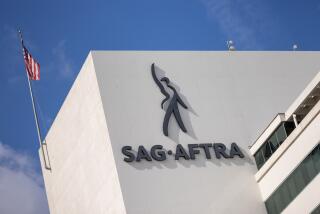Pact Expires; Studios, Writers Still Talking
Hollywood studios appeared within reach of an agreement with television and film writers late Tuesday on a new three-year contract that could avert a crippling strike for the entertainment industry and the Los Angeles economy.
As the old contract expired at 12:01 a.m. today, negotiators for both sides continued trying to resolve their differences as talks remained fluid and fragile.
Shortly after midnight, a Writers Guild of America official announced that negotiations would continue throughout the night.
“At this hour, the talks are continuing and we are working very hard to reach an agreement,” said guild official Cheryl Rhoden.
Added Bryce Zabel, a TV writer and guild board member, “The clock is ticking. We’re hoping for the best. But we don’t make the final offer, they do.”
Late into the evening, the studios still had not delivered their final offer, according to two high-level sources.
If an agreement is reached between the Writers Guild and the industry’s Alliance of Motion Picture and Television Producers, it would significantly blunt fears that actors will walk out this summer, causing a shutdown of film and TV production. Although actors aren’t expected to sit down with studios for two more weeks, a possible resolution with writers would set a template for a new agreement to replace their current contract, which runs through June.
One source who was briefed several times Tuesday on the status of the talks with writers and studios said, “It looks like they’re making a deal.”
Another source close to the negotiations added: “They’re sticking it out and working toward getting a deal done.”
Several sources said much progress was made during late-night talks Monday at the Writers Guild headquarters, which went until 11:30 p.m. That fueled optimism going into Tuesday’s negotiations.
While progress reportedly was being made late Tuesday, negotiations remained sensitive as final details--such as language and definitions--were still being hammered out. In addition, any potential deal would still require ratification by the guild’s 11,500 members.
The two sides had a basic outline of a proposed settlement late Tuesday, but sources cautioned that the framework remained in flux and could change. Though writers gained some concessions, there appeared to be no wholesale restructuring in how they are paid, as some had hoped.
A new contract would end the most tense labor negotiations in Hollywood since 1988, when writers walked out for 22 weeks in the last major strike against studios.
Both sides have been under increased pressure to settle in recent weeks after Los Angeles Mayor Richard Riordan launched a full-court public relations blitz and commissioned an economic study that estimated the loss of 81,900 jobs and $6.9 billion in income for Southern California if strikes by writers and actors lasted from May through October.
Arguing they have been shortchanged for years, the guild had been seeking significant gains when the work of writers runs on cable TV, in foreign markets and on the Fox network and is sold on videocassette or DVD. In addition, the writers sought a toehold in fledgling distribution outlets such as the Internet. Screenwriters also have been seeking more access to the movie-making process and limits on the proliferation of “A film by” credits that studios award to directors.
According to sources briefed on the negotiations, writers are not expected to get a boost in payments for reruns on basic cable TV channels, but they could receive increased payments for programs made for pay television channels such as HBO’s “The Sopranos.” Pressure to raise payments for cable reruns has eased in recent weeks in the wake of some blockbuster sales of programs such as “The West Wing” to Bravo and “C.S.I.: Crime Scene Investigation” to TNN. Writers already receive 2% of the fees cable channels pay for shows.
In the foreign area, writers are expected to work under the same formula, where they now get a one-time payment of 35% of their minimum fees. But writers could get bonus payments if a one-hour episode is sold overseas for more than $700,000 or a half-hour one is sold for more than $350,000.
The sources also said the Fox network, which currently enjoys a discount on the amount other networks pay in residuals, has agreed to raise the rate to 85% from 66% and is committed to eventually reaching 100%.
The amount writers would be paid when fledging video-on-demand systems develop has been effectively tabled. Writers agreed to let companies such as Sony Corp. and Walt Disney Co. develop systems that would let consumers download movies as long as the issue could be revisited if those systems start to generate significant revenue during the course of the contract.
Studios have been taking a harder line on increasing payments for videocassette and DVD sales, and they are not expected to give much, if at all, on that issue.
Writers are expected to get an increase of about 3% in their minimum pay scale. Studios are expected to take off the table a proposal to roll back payments that writers get when shows are rerun on cable TV shortly after they air on networks in a procedure called “double bursts.”
In the area of creative rights, studios are expected to make some concessions in tandem with the Directors Guild of America to address some concerns writers have about being included in the movie-making process, such as gaining access to sets and the routine awarding of “A film by” credits to first-time directors. This was a concern shared by screenwriters but not most TV writers. Sources said they expect any agreement in this area to be crafted as separate guidelines similar to a “code of preferred practices” rather than actually written into the writers’ contract.
Those creative issues took a back seat to the money proposals, especially with two-thirds of the guild made up of TV writers.
Writers and studios started talks on a new contract in February. They broke off March 1 with both sides accusing each other of being unrealistic in their demands.
The parties resumed talks two weeks ago, working under an intense spotlight to resolve their differences amid a softening economy, aggressive lobbying by Riordan and pressure from other Hollywood unions that didn’t want to see a strike, including the Teamsters, the International Alliance of Theatrical Stage Employees and the Directors Guild of America.
Money issues were at the heart of the talks, with the dispute turning bitter after negotiations broke off in March. Each side launched a public relations effort to discredit the other’s estimates of how much a new contract would cost.
Writers argued that their proposals would cost studios a total of nearly $100 million over three years, while studios said their numbers showed the cost would be $227 million and hundreds of millions more if they had to give similar deals to other guilds and unions. DreamWorks SKG partner Jeffrey Katzenberg went so far as to say that the guild’s proposals would “simply bankrupt” studios.
Negotiations extended late into the night at the guild’s headquarters at 3rd Street and Fairfax Avenue near Farmer’s Market. The guild converted a vacant former bank in the lobby of its building into a media center. A podium and two tables for officials were placed in front of a blue and white screen emblazoned with the words “Writer’s Guild of America, America’s Storytellers.”
Since talks resumed, tensions have significantly eased, with both sides holding their fire and adhering to a news blackout.
Studios still need to negotiate a new contract with nearly 135,000 members of the Screen Actors Guild and the American Federation of Television and Radio Artists, who last year struck the advertising industry for six months over pay they receive for commercials.
Over the weekend, the boards of those two unions announced they had approved their contract demands. Although they have not released specifics, the two groups said in a joint statement that their proposals “are thought to be one of the most streamlined and focused in the history of these negotiations,” suggesting that the scores of minor issues that have often bogged down past talks were not included.
Typically, Hollywood engages in “pattern bargaining,” in which one guild’s deal serves as a template for other guilds.
If there is a writers settlement, pressures from other Hollywood unions “will be tremendous for SAG to settle as well,” said Alan Brunswick, a labor relations lawyer with Los Angeles law firm Manatt, Phelps & Phillips.
Seeds for this year’s tense labor negotiations were planted in 1998 when writers ousted the guild’s executive director, Brian Walton, amid accusations that he had become too cozy with studios. Ironically, Walton is now working as chief negotiator for the Screen Actors Guild.
The guild entered negotiations headed by one of its most powerful members, John Wells. A prolific writer who serves as executive producer of “E.R.,” “The West Wing” and “Third Watch,” Wells and other negotiators sought major changes in the rates writers are paid, arguing that they had cut studios slack for years to allow cable and foreign markets to develop.
But facing writers were big multimedia parent companies such as AOL Time Warner, News Corp., Vivendi Universal, CBS parent Viacom Inc. and Walt Disney Co. and its ABC network. Many of those companies were forged over the last six years through giant mergers, with studio operations making up a smaller percentage of the overall business.
Also absent was retired mogul Lew Wasserman, who despite being a studio head could be counted on to forge labor agreements as a trusted industry leader.
Sensing a potential shutdown, studios began preparing for strikes with a vengeance as early as last summer, ramping up production of films and TV programs.
Sound stages have been booked solidly, with stars and directors squeezing in as much work as possible before the deadlines. Even if there is no walkout, production already is slowing temporarily because studios have filled their shelves with films and shows, spent a big chunk of this year’s production budgets and have been reluctant to give the go-ahead to major projects until they are certain there will be no strikes.
Networks also made contingency plans for fall schedules, which will be announced in two weeks, loading up on unscripted programs like “Survivor,” news programs and sports as possible alternatives to dramas and sitcoms.
Times staff writer Meg James contributed to this story.






